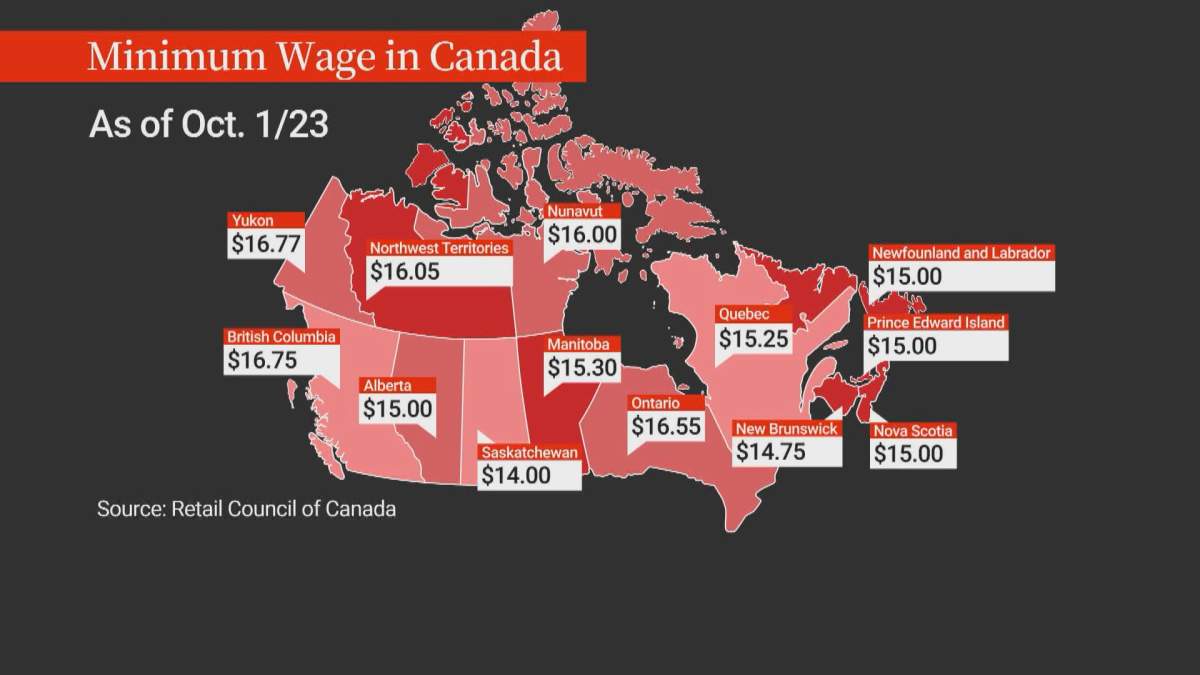Exactly five years ago Sunday, the Alberta government increased the minimum wage to $15 an hour. On Sunday, six provinces upped their minimum wage once again, but not Alberta, which hasn’t changed it since that day.

On October 1st, 2018, Alberta had the highest minimum wage in Canada but since then a lot has changed.
“The cost of living has gone up 18 per cent. In fact, we’ve seen inflation at it’s highest level in 40 years,” said Gil McGowan, president of the Alberta Federation of Labour.
At that time it was the highest in the country, with most provinces hovering around $11 or $12 an hour. But this year, several provinces have boosted their minimums meaning Alberta’s $15 an hour has now fallen in the ranks, nearing the bottom.
Yukon is on top at $16.77 an hour and B.C. isn’t far behind at $16.75. The only provinces that have a minimum wage lower than Alberta’s are New Brunswick and Saskatchewan, which increased their wage to $14 on Sunday. The rest of Canada is between $15.25 and $16.55 an hour.
Many governments tie their wage to inflation, something the Alberta Federation of Labour (AFL) would like to see done in our province.

Get weekly money news
“Working Albertans are really suffering as a result and it’s not just the people earning minimum wage. That minimum wage is an anchor and right now it’s dragging everyone down in the entire wage scale,” McGowan said.
“Politicians fall all over themselves to say that they want to help ordinary Canadians deal with the rising costs of living and inflation. But, the bottom line is that the best way that governments can help ordinary Canadians deal with rising prices, is to make sure that their wages keep up with inflation.”

However some consider a minimum wage increase to be a setback for business owners – as they may not be prepared to spend even more.
“Often what happens anytime the minimum wage goes up that puts pressure on other wages of employees that aren’t at minimum wage. But it does have that ripple down, trickle down effect,” said Annie Dormuth, CFIB provincial director for British Columbia and Alberta.
The Alberta government however is making it clear, it will stay at $15 an hour.
“Maintaining the current minimum wage gives employers and employees predictability and stability during a time of economic growth and labour shortages. Alberta’s government has no immediate plans to change the current minimum wage,” said Andrea Smith, spokesperson for the Ministry of Jobs, Economy and Trade.

McGowan views that approach as a wage suppression strategy coming at the worst possible time.
“It’s heartless frankly, it’s heartless and it’s insulting. It’s ignoring the fact that so many Albertans struggling with this rising cost of living,” he said.
The AFL says an inflation tied wage would bring Alberta’s to $17.70 an hour.
- Can Trump decertify aircraft? What experts say amid Bombardier threat
- Corus to seek court approval of recapitalization plan after shareholder vote narrowly fails
- Bombardier warns of ‘significant impact’ to travellers from Trump’s threat
- Canadians have billions in uncashed cheques, rebates. Are you one of them?









Comments